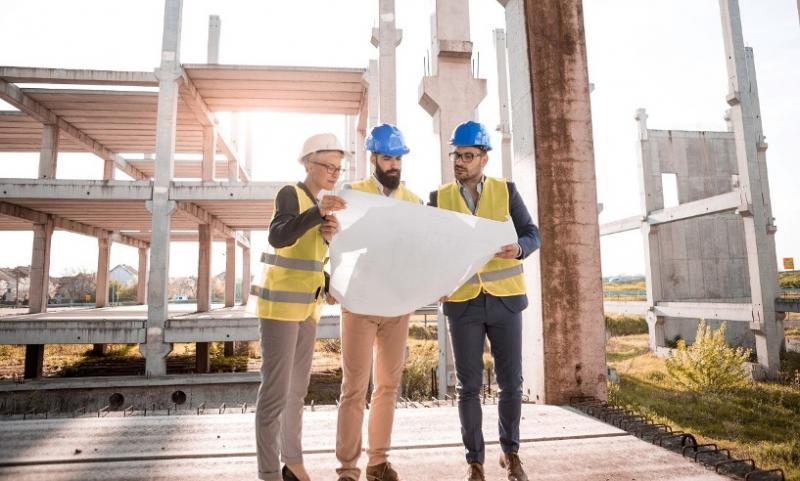RESPONSIBILITIES OF THE CONSULTANTS IN A CONSTRUCTION PROJECT

A construction project is a science that helps to provide a desired building or structure for any purpose. Thus, a construction project cannot reach completion without taking help from that expert in the field. These professionals have the idea to shape the structure according to requirements. The term coined for such professionals is a construction consultant who acts as independent engineers; they perform a well-detailed engineering service for a client on an agreed sum of money. The services offered by these consultants and render to a specific profile in line with their general practices. The consultant has to remain unbiased with the recommendation laid in front without feeling any deviation.
On a construction project, many professional consultants remain on-board, all carrying out separate roles. The number of consultants involved and the type of procurement depends on the construction project size. However, for most projects, significant consultants remain the same. Construction consultants are the ones who perform various tasks on a project. These include providing advice on defining the project and coordinating the design. They also must prepare product information, administer the contracts, and supervise the work of contractors.
TYPES OF CONSTRUCTION CONSULTANTS
The team of construction consultants usually consists of the following individuals:
1. ARCHITECTS
An architect is a professional that plans, design, and oversees the construction process. Architects provide a service in connection with the building design and surrounding space to fulfill the purpose. Their decision affects public and structural safety, and they have to undergo rigorous training and advanced education. They are the ones who complete the specifications and details of a project.
2. COST CONSULTANTS
These professional consultants are the ones who keep all the budgetary aspects in check. They help define a project budget and benchmark all the requirements in comparison with similar projects. Their assessment of the value of money allows them to prepare financial plans and cash flow estimations.
3. SERVICES ENGINEER
Services engineers are consultants that contribute to the design by the overall standards and strategies intended. The best construction consulting by service engineers determines the effectiveness of the design from an early stage. Their expertise assesses the lifecycle of the project and minimizes resource wastage during construction.
4. STRUCTURAL ENGINEER
The structural engineer is the one responsible for site surveys and appraisals. They are the primary players who verify and investigate every aspect of a project to ensure the building has efficiency and stability.
ROLES OF CONSTRUCTION CONSULTANTS
At the start of any project, bypassing the importance of a construction consultant means serious errors. A construction consultant's need arises when there are special needs for foundations or regulation of budget accordingly. Their expertise in areas like soil analysis or budget estimation makes them an essential part of the project. The roles of these professional consultants include:
1. CONSULTATION
It is a situation that arises when a person needs an expert opinion on a specific technical problem. The consultant may require some time to assess the case based on the critical nature of the problem. The nature and challenge of the situation determine the duration of the consultation or require traveling to that site.
2. PROBLEM INVESTIGATION
The construction consultant needs to study and investigate a problem that requires expertise in engineering calculations. Some consultants may visit the site to inspect the structure and equipment present. The consultant also assesses the problem by studying the detailed reports prepared by the management and other engineers.
3. GENERATION OF FEASIBILITY REPORTS
Preparation of reports is a crucial aspect in determining the feasibility of the construction project. Consultants prepare these reports after assessment and surveys, along with different engineering studies conducted on-site. These reports also hold the importance of confirming the solutions following the feasibility of the structure. The aspects highlighted in the feasibility report are the main requirements and unique needs of the project. It contains estimated costs, recommendations, conclusions, and alternate solutions.
4. ENGINEERING DESIGNS
This consultation aspect includes the physical characteristics and the dimensions included in a project. A consultant plans and presents the dimensions in the form of a drawing, which non-professionals call blueprints. They supplement these blueprints with written documents termed as specifications. The consultants study the plan and specifications to direct the work of the contractor according to requirements. The design process also determines the amount of material needed to initiate the construction process.
To summarize, a construction consultant's role is to help the client choose the best contractor and material. Procurement is a necessary process in which a consultant accepts proposals from different suppliers based on the material's quality and economic feasibility. They seek bids from manufacturers through public notices following the plans and specifications. The construction consultant then recommends the best contractor by the bid's preset.
FINAL WORD
The construction consultant plays a vital role from the beginning to the finalization of the project. Their expertise in their relevant area gives them a clear assessment of the situation and analyzes the problem. These professionals then prepare a feasibility report based on their reviews and recommend the best course of action. Their final role lies in the assessment to determine the stability and longevity of the finished building.
More to Read:
Previous Posts:




